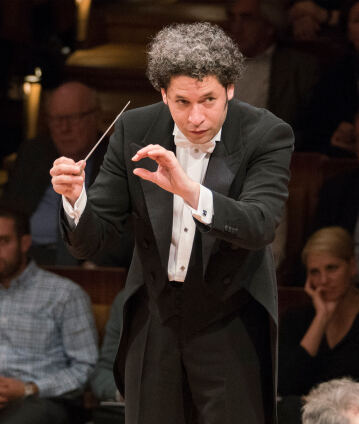Gustavo Dudamel conducts Bernstein and Shostakovich

In 1944, at the age of just 25, Leonard Bernstein conducted the first performance of his First Symphony, a work based on the Old Testament lamentations of the Prophet Jeremiah and which demonstrates astonishing musical and intellectual maturity. The same expressive intensity characterises Shostakovich’s Fifth Symphony, which dates from the same time, but from a completely different sound world. The conductor of this exciting juxtaposition is Gustavo Dudamel.
“I am always writing the same piece, as all composers do,” Leonard Bernstein said of his symphonic output. “The work I have been writing all my life is about the struggle that is born of our century, a crisis of faith.” Bernstein’s treatment of such an existential theme within the most important instrumental genre suggests other large-scale works of the twentieth century: the symphonies of Gustav Mahler, who wanted “to build a world with every available technical means”, or Jean Sibelius, who in one diary entry writes about musical “professions of faith”, and those of Dmitri Shostakovich, who is said to have described all his symphonies as “tombstones”.
For his First Symphony Jeremiah, Bernstein selected a total of eight verses from the Hebrew “Lamentations of Jeremiah the Prophet” about the destruction of the holy city of Jerusalem as a symbol of the central crisis of faith. The use of melodic motifs from traditional cantillation (the form of ritual chanting practiced in Jewish worship) meant that the poignant three-movement work assumed a typically “Jewish” tone, which also gave it political significance: “How could I close my eyes to the problems of my own people?” said Bernstein in an interview before the first performance in Pittsburgh on 28 January 1944. “I’d give everything I have to be able to strike a death blow at fascism.” In these concerts, the direction of Leonard Bernstein’s First Symphony is in the hands of Gustavo Dudamel. The vocalist is the Canadian mezzo-soprano Tamara Mumford who today is a regular guest at major festivals and opera houses as a graduate of the Lindemann Young Artist Development Program of New York’s Metropolitan Opera.
After the interval, the programme continues with Dmitri Shostakovich’s Fifth Symphony which since its triumphant premiere on 21 November 1937 has been one of the Russian composer’s most performed works. Officially, it was understood as a “Soviet artistʼs response to just criticism” (Shostakovich), although in the music, the socialist demand for monumentality and popularity is reduced to absurdity. “The rejoicing,” said Shostakovich, “is forced, created under threat, as in Boris Godunov. It’s as if someone were beating you with a stick and saying ʻyour business is rejoicing, your business is rejoicingʼ.”
© 2018 Berlin Phil Media GmbH
Related interview